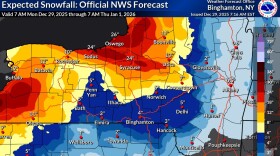Gov. Andrew Cuomo is floating the possibility that New York may have to raise taxes to close a pandemic-related budget gap. The remarks are encouraging long time advocates of imposing higher taxes on the wealthy.
As the months have stretched on with no new federal bailout package that includes help for states coping with COVID-19 related costs, Cuomo has begun to talk about ways to close what he said is a $15 billion budget gap. He said new taxes will be part of that plan.
“I believe we are going to have to raise taxes, at the end of the day,” Cuomo said on December 9.
The governor did not specify what kind of taxes he has in mind, but his words heartened many progressive groups and state lawmakers who have long advocated for higher taxes for the state’s richest residents. They say many of the state’s 118 billionaires have seen their wealth increase during the pandemic. The legislative leaders, Assembly Speaker Carl Heastie and Senate Leader Andrea Stewart-Cousins, who are both Democrats, are on record favoring increased taxes on the wealthy. Speaker Heastie has raised the possibility of the Legislature returning for a December session to address tax increases.
At a recent news conference on Zoom, state Sen. Alessandra Biaggi, a Democrat from the Bronx, said nine months into the pandemic, it’s time to act.
“If we do not enact revenue raisers, if we do not make sure that we close this budget deficit, all of our communities are not going to recover,” Biaggi said. “That will be blood on our hands. I am not okay with that.”
In addition, to increasing the state’s top income tax brackets, advocates also support restoring the stock transfer tax. For years, that sales taxes on stock transfers has been rebated back to investors. There is also a proposal for a pied-a-terre tax in New York City. It would raise tax rates on luxury homes owned by part-time residents.
Many of the tax increases were first proposed before the pandemic hit. Advocates, believing in a more equitable distribution of income, wanted the additional revenues to provide more services to the neediest.
Cuomo said whatever taxes he might ultimately agree to, they must be limited to what’s needed to balance the budget.
“It’s not just a political decision, it’s a revenue decision,” Cuomo said on December 14. “How much money do you need to balance the budget?”
The governor has also warned that taxing the state’s wealthiest will only cause them to leave New York. The governor spoke during a teleconference with reporters on September 15.
“People say, 'Well, raise taxes, raise taxes.' I raise taxes, it puts the state at a competitive disadvantage because other people can go to other states and taxes are very high in the state to begin with,” Cuomo said.
EJ McMahon, with the fiscally conservative watchdog group The Empire Center, agrees with Cuomo that at least some wealthy individuals will leave the state if taxes are increased. He said multi-millionaires and billionaires often own more than one home, so it would not be that difficult to shift more of their time to a house in a different state and establish residency there.
“You could have only a few percentage points, the 1%, 2%, 3% of the highest earners leave New York,” McMahon said, “And it could have a very significant effect on revenues because each one of them pays so much in taxes.”
Some advocates of higher taxes on the wealthy remain unsympathetic to that argument. Sen. Luis Sepulveda was also part of the Zoom press conference.
“Millionaires leaving if we raise taxes?” Sepulveda said. “Well, I say ‘I will open the door and make sure it doesn’t hit them on the ass on the way out.”
“If you don’t have the heart to want to say, ‘I will contribute more, to help millions of people,’” he continued. “Then leave the state, find another place to live. We’ll find other millionaires that are chomping at the bit to move into this state.”
Cuomo is not ready to make any decisions yet. Leaders in Congress are trying to reach an agreement on a relief package before the holidays. Cuomo said if that measure does not include a bailout for the states, he’ll wait until after President-elect Joe Biden is inaugurated on January 20, with the hope that another relief package can be passed, then. The state’s fiscal year does not end until March 31.








